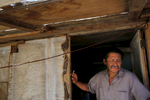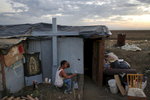Without Water, Without Work
In the third and fourth years of California's punishing drought, a shantytown grew in a dried-up canal bed on the outskirts of Mendota. The town is home to many farm workers who depend on the agriculture industry for income. As farmers fallowed more land, jobs dried up. A homeless encampment that began with only a handful of structures grew to nearly 30 at its peak during the spring and summer of 2015.












